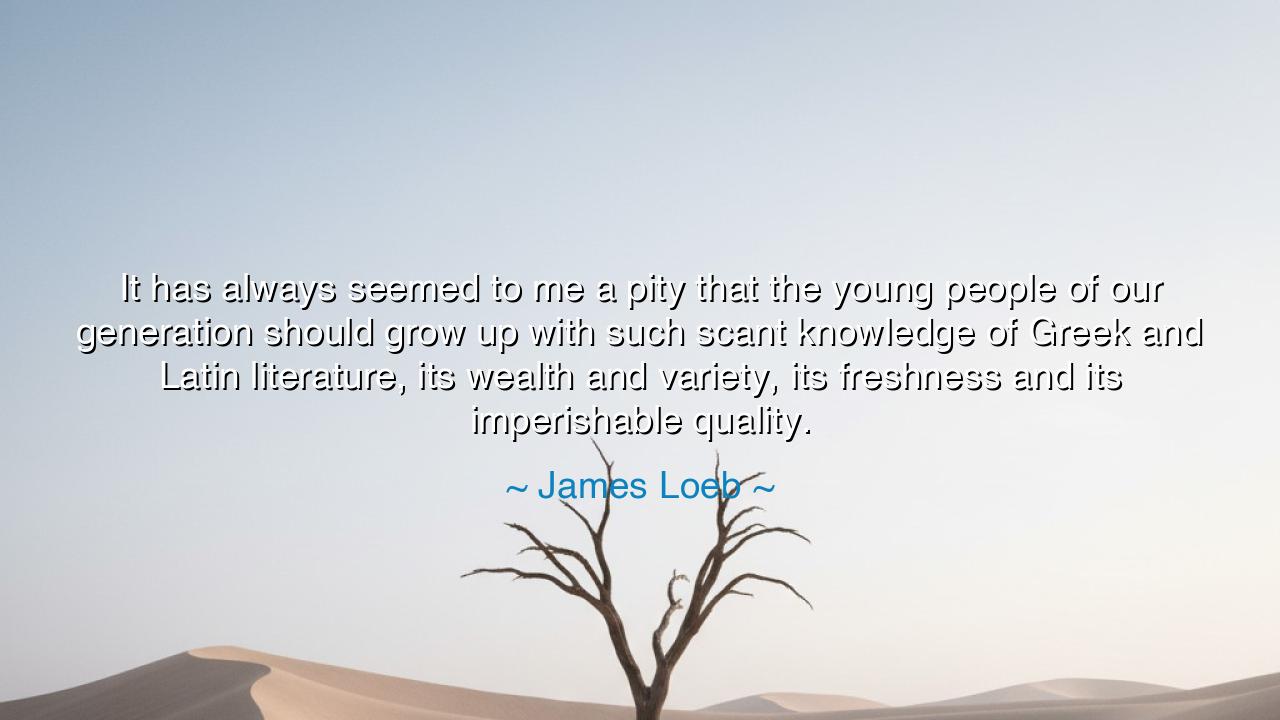
It has always seemed to me a pity that the young people of our
It has always seemed to me a pity that the young people of our generation should grow up with such scant knowledge of Greek and Latin literature, its wealth and variety, its freshness and its imperishable quality.






“It has always seemed to me a pity that the young people of our generation should grow up with such scant knowledge of Greek and Latin literature, its wealth and variety, its freshness and its imperishable quality.”
Thus spoke James Loeb, scholar, philanthropist, and lover of the classical world — a man who sought to preserve the eternal voices of antiquity for all time. His words are not those of lament alone, but of reverence — a cry from the heart of one who knew that within the Greek and Latin classics lies the living soul of Western civilization. To Loeb, the loss of familiarity with these works was not a mere fading of academic tradition, but a fading of light — the dimming of the flame that had illuminated human thought for centuries.
When Loeb speaks of “Greek and Latin literature,” he refers to more than old texts written on fading parchment. He speaks of the great treasury of human wisdom: the poems of Homer, the philosophy of Plato, the histories of Livy and Tacitus, the tragedies of Sophocles, the eloquence of Cicero, the meditations of Marcus Aurelius. These are not relics; they are living fountains — clear, strong, and ever-flowing. Their wealth and variety encompass the fullness of human experience: the glory of battle, the pain of exile, the pursuit of truth, the serenity of wisdom. To lose touch with these voices is to lose communion with the roots of our moral and intellectual heritage.
The origin of this quote arises from Loeb’s life’s work — the creation of the Loeb Classical Library, a monumental project that sought to make Greek and Latin texts accessible to all, with their English translations printed on facing pages. He believed that knowledge of the ancients should not be confined to scholars in ivory towers, but should be placed in the hands of every earnest soul who wished to understand humanity’s story. In the early twentieth century, as modern education turned increasingly toward technology and specialization, Loeb stood as a guardian of cultural memory. He saw in the ancient languages not obscurity, but clarity; not irrelevance, but immortality.
When he mourns that the young grow up with “scant knowledge” of these works, he is not chastising them — he is warning them. For the loss of the classics is not only the loss of beauty in language, but the loss of moral imagination. The ancients taught not just rhetoric and grammar, but virtue, courage, restraint, and reflection. In Homer, the warrior learns honor; in Virgil, the exile learns endurance; in Socrates, the thinker learns humility before truth. The study of the classics refines not only the intellect but the soul. To neglect them, Loeb believed, was to allow a generation to drift untethered from the wisdom that once steadied the human spirit.
Consider, for example, the story of Thomas Jefferson, who carried with him a lifelong devotion to the classics. In his youth, he memorized passages from the Greek poets; in his age, he found solace in the philosophy of Epicurus and Epictetus. The words of the ancients guided his vision of liberty, discipline, and virtue. When he penned the Declaration of Independence, he did so with the rhythms of Cicero’s prose and the ideals of Aristotle’s ethics echoing in his mind. From these ancient fountains flowed the principles that shaped modern democracy. Thus, Loeb’s lament is no mere nostalgia — it is a recognition that civilization itself rests upon these enduring pillars of thought.
In every age, the wisdom of the ancients must be rediscovered, for it does not pass away. The truths of Greek and Latin literature are not bound by time or nation; they speak to the eternal conditions of the human heart — to our love of beauty, our struggle with fate, our hunger for justice. The young who turn their eyes to these works find not a dead language, but a mirror — one that reflects their own passions, fears, and hopes with startling clarity. To read the ancients is to converse with immortals; to neglect them is to silence the very voices that taught mankind to think.
Therefore, O student of the future, heed the wisdom of James Loeb. Do not let the treasures of the past be buried in forgetfulness. Return to the sources — to Homer and Plato, to Virgil and Seneca — and drink deeply from their springs. Let their freshness renew your spirit, and their imperishable quality remind you that truth, beauty, and virtue are never outdated. Study not only for knowledge, but for understanding; not only for words, but for wisdom.
For the ancients still speak, if only we listen. Their languages may be old, but their insight is ever young. And when you learn their words — when you read their verses and ponder their thoughts — you do not merely study the past; you awaken a part of your own soul that has slept too long. Then you will see, as Loeb saw, that the classics are not the ashes of dead civilizations, but the embers of eternal fire, waiting only for the breath of the living to make them burn again.






AAdministratorAdministrator
Welcome, honored guests. Please leave a comment, we will respond soon